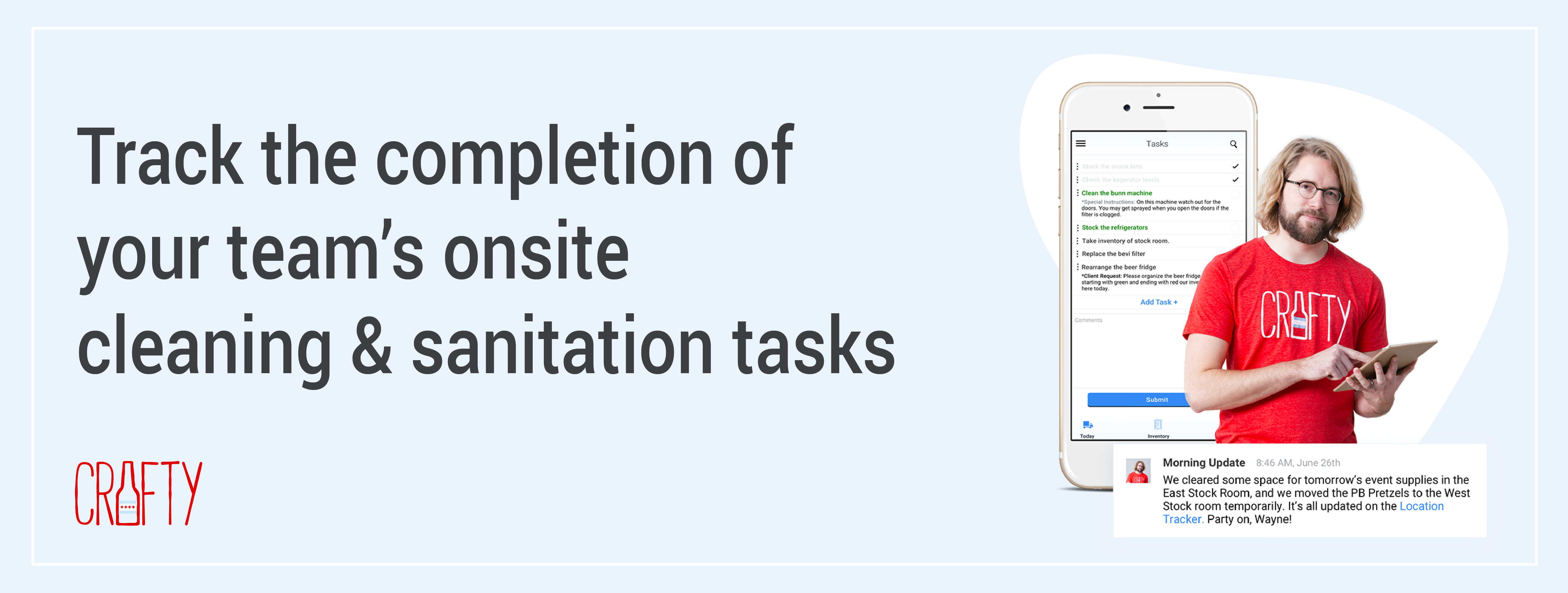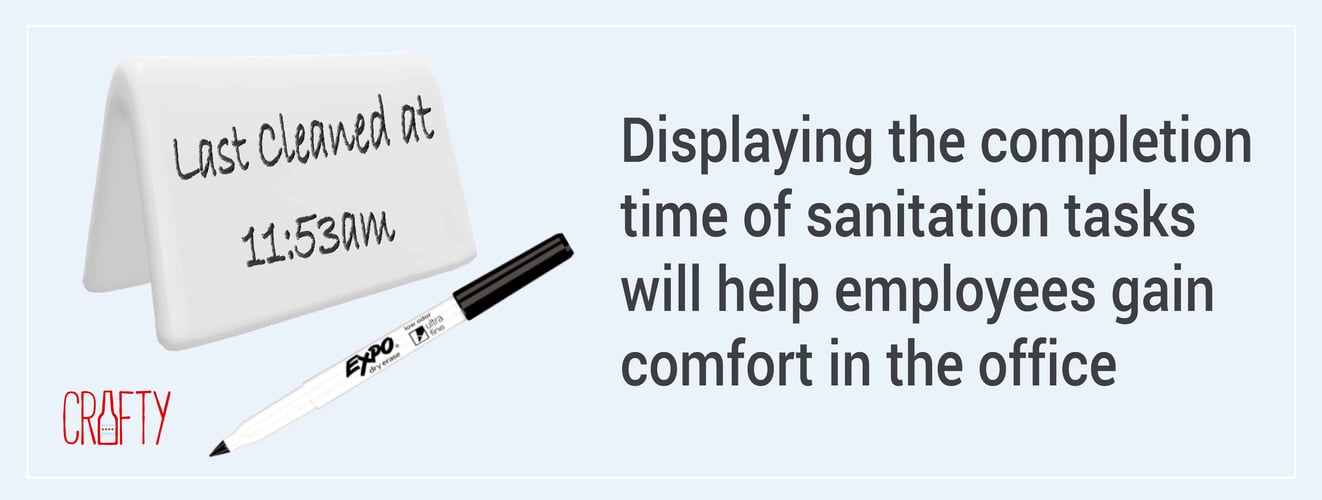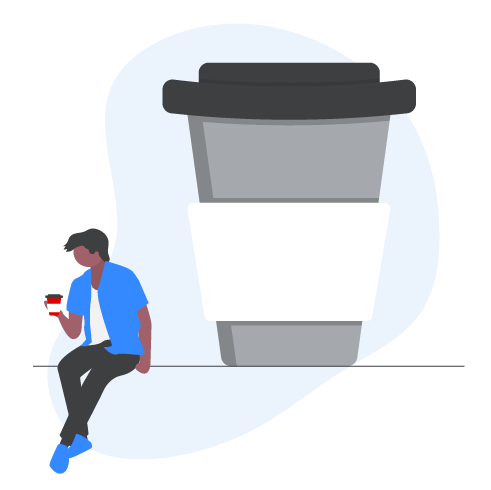- Crafty College
- Operate
- COVID-19 Guide
- Onsite Operations
Onsite Operations for Office Pantry Programs

Now that we have pandemics to avoid, daily kitchen operations will bring a renewed focus on sanitation, deep cleans, protocols, and safety.
Instead of end of day cleans, our new cadence is “as frequently as possible.”
As a result, the role that your vendors play is more consequential than ever (get yourself a Field Operations team).
Whether your team is managing your own internal food & beverage program or you have the support of a vendor like Crafty, there are new principles that should be the focus of your onsite operations of your office’s food & beverage program in light of COVID-19:
- Training & certification
- Cleaning procedures
- Personal items
Training & certification
At Crafty, we use the standard cleaning and food handling procedures provided by ServSafe.
ServSafe is a food and beverage safety training and certificate program administered by the U.S. National Restaurant Association. They are the Meryl Streep of the food safety world -- the most respected in their field. The ServSafe Food Handler Certificate verifies food safety knowledge for individuals in food handler employee-level positions.
We recommend displaying the certificate of completion in a visible place, so that employees can find comfort in knowing your onsite team is certified by an accredited institution.
In addition to ServSafe, following the health and safety guidance from the CDC (Center for Disease Control and Prevention), WHO (World Health Organization) and local health departments is essential. As it relates to workplace food & beverage operations, here are four critical messages that these organizations are asserting:
- Re-educating and re-iterating to all staff the proper hand washing technique
- Increased access to soap, one-use towels, hand sanitizer, gloves and facial masks
- Increased sanitization of preparation facilities, delivery vehicles, and any materials needed for serving and delivery
- Requiring that all employees with any symptoms stay home
Cleaning procedures
Cleaning procedures will need to be more expansive than ever before. No time to lean, only clean!
Leverage your vendors to coordinate a comprehensive cleaning schedule that goes beyond the inside of your office. We are encouraging WOF Teams ("Workplace, Office, Facilities") to take a more holistic view of cleaning than ever before and that starts with transportation to and from the office.
We have created some guidance for our public transportation riders:
- Wash their hands prior to and after traveling
- Use hand sanitizer and limit touching surfaces
- Keep at least 6 feet between themselves and another rider. (i.e. avoid sitting in a vacant seat directly next to another rider, keep at least one row of seats between you and other riders)
- Spread out! If your bus or rail car appears full, consider moving to another rail car, or waiting for the next bus or train
- Wear a cloth face covering or mask while in public setting
We realize there is a big asterisk on all of these that read “whenever possible.” Oftentimes, riders have absolutely no choice and have to go against some of these guidelines. These are just suggestions for when they do have the opportunity.
Inside the office, disinfection & deep cleans should take on a new level of frequency. We like to think of this as the “pretend your mother is coming for a visit all day everyday” method. Onsite operations staff should focus on surfaces repeatedly touched by employees or guests.
High risk surfaces include:
- Door, cabinet, and drawer knobs
- Equipment handles and dispensers
- Counters
- Baskets
Crafty team members are using alcohol-based wipes or sprays containing at least 70% alcohol to disinfect surfaces, such as equipment touchscreens, kegerator tap handles, refrigerator door handles, and coffee pot dispensers. We are also placing single-use tissues and hand sanitizer by all equipment.
Tracking the regular completion of these tasks is critical. Our teams will be able to track the completion of the onsite tasks in their Operations App, but even Microsoft Excel, Google Sheets, or the timeless clipboard approach can do the trick.

We encourage all clients to work with their building cleaning staff to launder porous surfaces (e.g. throw pillows, rugs) frequently to sanitize and disinfect these surfaces.
Surfaces should be cleaned with EPA-registered disinfectants every 30 - 60 minutes, depending on the size of your office and the frequency that surface is touched.
After each clean is completed, use signage to indicate the completion of the cleaning protocol, which will help employees feel comfortable knowing that cleaning protocols are in place.

WOF Teams should also ask their vendors to share the cleaning procedures that are being enforced throughout their entire supply chain. Below are some of the things that we are doing at Crafty.
In our warehouses and across our delivery teams:
- Temperature checks will be required before the beginning of each shift
- While on the floor of the warehouse, all employees will wear Crafty-provided reusable masks
- All high-touch areas will be sanitized between each shift
- The Crafty warehouse will only be accessible to Crafty employees, and all inbound deliveries will be left at the loading dock and operated as contactless deliveries
- Deliveries will be wrapped in pallet wrap and left in pallet wrap with delivery
- After the inbound product is sanitized, the next individual to touch a pallet is the client or operator
- Sanitizer will be left in trucks to clean hands before and after every delivery
- Delivery specialists will wear masks at all times of delivery
- Delivery drivers wear washable, reusable work gloves, and disposable gloves while delivering products
- Protocol calls for not touching food unless necessary
Personal items
WOF Teams will need to institute new rules and guidelines to the use of personal water bottles, tupperware, and other washable and reusable personal items.
We know the intention is good when using reusable products, but given this new sci-fi movie we now live in, we’re gonna have to shelve those bad boys for the time being.
So, we are encouraging WOF Teams to disallow the use of personal canteens for water and other beverages and instead asking people to use biodegradable or compostable paper goods & plasticware.
Storage of personal meals brought from home should be limited to specific, sanitized areas that are easily accessible and scattered throughout the office.
This may require the installation of additional single door refrigeration, and for those machines, there should be a daily removal of personal items that are not brought home.
Hopefully the fear of waste will encourage our office buds to take their meals home with them.
What to read next!

OPERATIONS
Cafe & barista services
Update your cafe layout and technology to operate a safer coffee program.
Published on May 19, 2020
Have questions? Want to bounce around some ideas? We're here for you!
Schedule a free 30-minute consultation with a member of the Crafty team.
